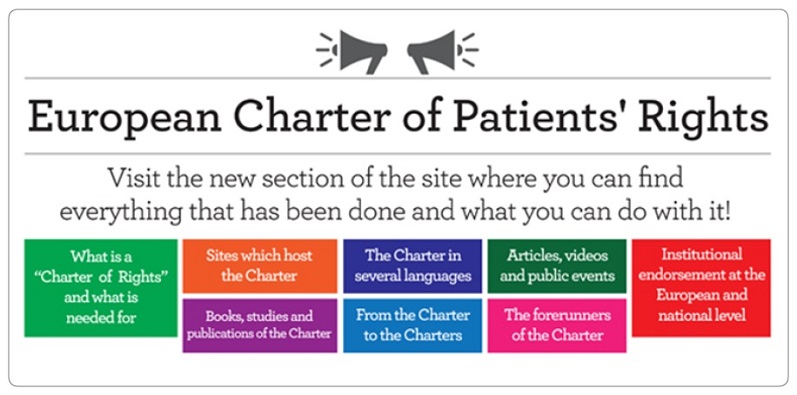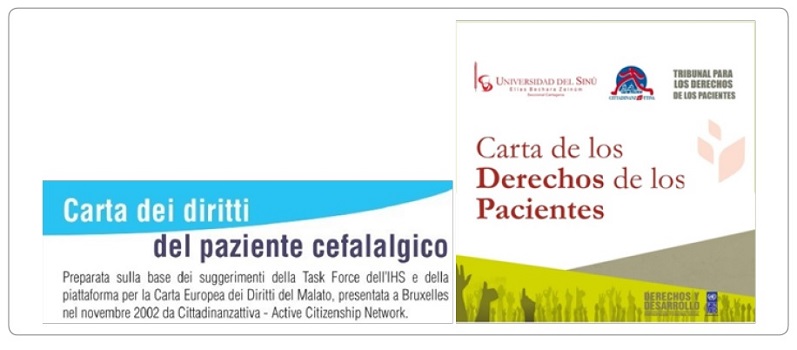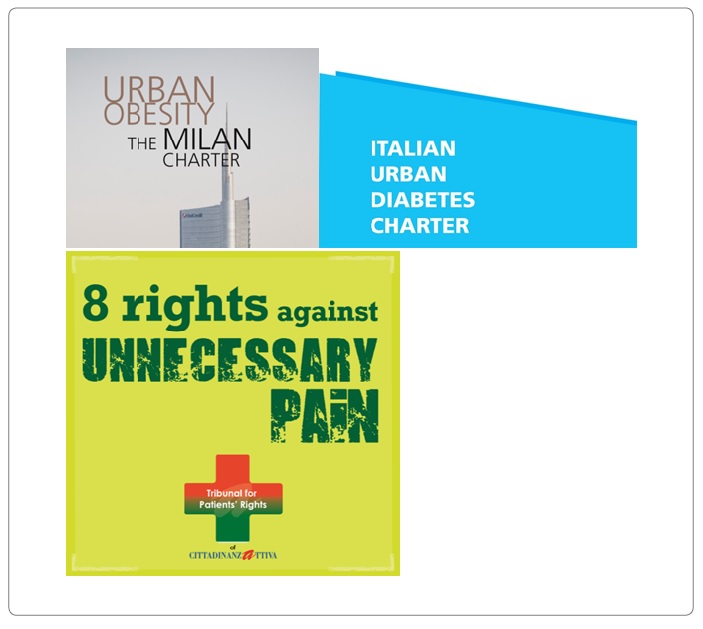Abstract
In 2002, Active Citizenship Network (ACN), together with 12 citizen organizations from 15 different EU countries, established the European Charter of Patients’ Rights, which lists fourteen fundamental patients’ rights which each EU country must protect and guarantee. The fourteen rights apply to all individuals and, together, aim to guarantee a “high level of human health protection”, as claimed in Article 35 of the Charter of Fundamental Rights of the European Union, and to assure the high quality of services provided by the various national health services in Europe. During the Covid-19 pandemic, ACN has gathered all the many achievements, information, documents, activities, and publications, realized over the years thanks to the European Charter of Patients’ Rights, in a new section dedicated to the Charter that can be found on ACN’s official website. The new section is a way to enhance the relevance the Charter still has today and to support all the ones focused on implementing the principles stated in the Charter and on proclaiming it in the framework of the European Patients’ Rights Day (EPRD) at the local, national, and European levels. The article aims to demonstrate the relevance the European Charter of Patients’ Rights still has in 2020 as a tool for advocacy and an official instrument recognized by national and European institutions.
Abbreviations
ACN: Active Citizenship Network; EPRD: European Patients’ Rights Day.
Introduction
In 2002, Active Citizenship Network (ACN), together with 12 citizen organizations from 15 different EU countries, established the European Charter of Patients’ Rights [1], which lists fourteen fundamental patients’ rights that each EU country must protect guarantee. The fourteen rights apply to all individuals and, together, aim to guarantee a “high level of human health protection,” as,” aimed in Article 35 of the Charter of Fundamental Rights of the European Union, and to assure the high quality of services provided by the various national health services in Europe. Being an embodiment of the EU fundamental rights, these rights must be recognized and respected in every country. They are correlated with duties and responsibilities that both citizens and health care stakeholders have to assume and are: right to preventive measures, right of access, right to information, right to consent, right to free choice, right to privacy and confidentiality, right to respect of patients’ time, right to the observance of quality standards, right to safety, right to innovation, right to avoid unnecessary suffering and pain, right to personalized treatment, right to complain, right to compensation.
Each of the EU countries’ national health systems manifests very different realities concerning patients’ rights. Some systems may have patients’ rights charters, specific laws, administrative regulations, charters of services, and many other provisions and procedures. On the other hand, other systems may have none of these. The European Charter of Patients’ Rights aims to reinforce the degree of protection of patients’ and patients’ rights in the different national and international contexts. Here, the Charter acts as empowerment, informative, evaluation, monitoring, and legal instrument.
As an empowerment and informative tool, the Charter informs and educates citizens. Health care workers collect forms of support for the Charter from many health stakeholders and professionals who underwrite specific commitments for its implementation, launch patients’ rights protection activities, and develop policies and programs to protect patients’ rights.
As an evaluation and participation tool, it is used as a common basis to evaluate and monitor healthcare services in Europe from the citizens’ point of view.
As a legal instrument, the Charter acts as the basis for laws on patients’ rights, and it can be formally recognized by the EU, national and local institutions.
During the years, going beyond the ACN constituency, a so-called “European Movement for Patients’ Rights” was born spontaneously. Especially in 2020, with the Covid-19 pandemic, the implementation of the European Charter of Patients’ Rights has proven more current than ever. In this still ongoing challenging health context, ACN has launched a social media awareness campaign to improve the European Charter of Patients’ Rights’ online visibility. But it has also gathered all the many achievements, information, documents, activities, and publications, realized over the years thanks to the European Charter of Patients’ Rights, in a new section dedicated to the Charter that can be found on ACN’s official website [2]. The updating of the website has been possible thanks to a policy-focused healthcare charitable contribution by Upjohn, a Pfizer division. For instance, the new section highlights the main 14 events and articles that had discussed the Charter in the last years, providing links and useful information on when and where the events took place. Another part of the section provides us with other 14 examples of how and where the Charter’s principles have been published around Europe.

The European Charter of Patients’ Rights as a tool for advocacy and an official instrument recognized at the European and national level.
Since its creation in 2002, the European Charter of Patient’s Rights has been drafted in 21 languages, becoming a reference for EU citizens’ rights in health care services, a tool for the harmonization of health systems that favors citizens’ and patients’ rights, and, most importantly, a milestone for the creation of other EU Charters. To date, 17 Charters were born thanks to the European Charter of Patients’ Rights, such as the Charter of Rights against Unnecessary Pain [3], the Colombian Carta de Los Derechos de Los Pacientes [4], the Charter of Rights of the Cephalalgic Patient [5], the Italian Urban Diabetes Charter [6], and the Milan Charter on Urban Obesity 2020 [7]. This multitude of Charters that refers to the rights of the European Charter of Patients’ Rights demonstrates not only the relevance the Charter still has today as a tool for advocacy but also acts as a support to all the ones focused on implementing the principles stated in the Charter and on proclaiming it in the framework of the European Patients’ Rights Day (EPRD) at the local, national, and European levels.


Even though it was written almost 20 years ago, the European Charter of Patients’ Rights still functions as an inspiration for creating other Charters and is still the main topic of many public events, web, and press articles in the last years. However, how can its relevancy be improved even more? How can the Charter act as a stronger tool for advocacy?
ACN has already been working on several initiatives to improve the European Charter of Patients’ Rights’ as a current and more effective tool for advocacy. Within the European Parliament, ACN has encouraged the idea of a MEPs informal Interest Group focused on patients’ rights [8] to recognize officially the value of citizens’ initiatives, such as the European Charter of Patients’ Rights and the European Patients’ Rights Day, which has been organized every year on April 18th since 2007 at local, national and EU level. The request was launched and then approved in May 2015 by the European Parliament during the IX Edition of the European Patients’ Rights Day. This is only the first step towards greater recognition of the Charter as a valuable instrument for advocacy, whose implementation is regarded as helpful even almost 20 years after its creation.
At the European and national level, many directives and laws have implemented the Charter’s principles, advocating for the protection of patients’ rights and making its principles and values become a reality in the health systems across Europe. In particular, the new section of the ACN website shows eight examples of how, over the years, the European and national Institutions underlined the importance of the European Charter of Patients’ Rights by endorsing it in their official documents. The Directive 2011/24/EU of the European Parliament and the Council on the Application of Patients’ Rights in Cross-Border Healthcare [9], the Italian Law No. 38 of 2010 regarding ‘Provisions to Ensure Access to Palliative Care and Pain Therapy’ [10], and the Maltese Health Act of 2013 [11] are only some of the many examples that have widely recognized the rights included in the European Charter of Patients’ Rights and have included them in their official acts and provisions. These institutions have also included the Charter in their online websites. Among them, the European Commission and the European Economic and Social Committee also help promote the Charter in this fight towards the achievement of a better healthcare system that respects all patients’ rights.
Conclusion
The European Charter of Patients’ Rights is a crucial point of reference for countless institutional and non-institutional subjects, both at the national and European levels. It has been and continues to be a milestone for the draft of many other Charters focused on protecting patients’ rights and the improvement of healthcare systems across Europe. ACN has been working on new methods to keep the Charter a relevant tool for advocacy even almost twenty years after its creation, such as the annual celebration of the European Patients’ Rights Day, officially recognized at the European level. In this Covid-19 pandemic, the Charter has to be implemented more than ever as a useful tool to reduce health inequalities, enhance the high quality of health care services, and a high level of human health protection.
Keywords
European charter of patients’ rights; Active citizenship network; Advocacy; Patients’ rights; Health care
Cite this article
Votta M, Quaggia D, Cardillo M. The relevance of the european charter of patients’ rights as a tool for advocacy in the framework of the covid-19 pandemic. Clin Case Rep J. 2021;2(1):1–4.
Copyright
© 2021 Mariano Votta. This is an open access article distributed under the terms of the Creative Commons Attribution 4.0 International License (CC BY-4.0).



